Testing And Rating Heat-Resistant Gloves
Published On: 5/22/2019 Last Modified: 6/8/2025
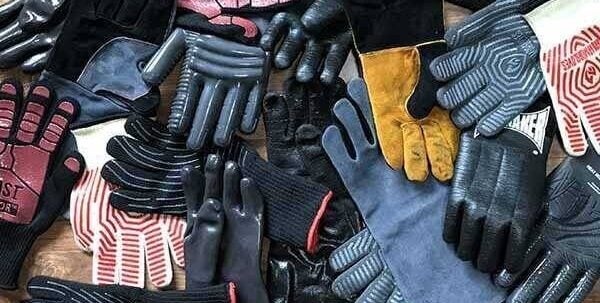
When it comes to barbecue and grilling, gloves are almost as important as salt and pepper.
We use them to handle tongs, hot grates, hot food, pizza stones, and even burning hot logs and coals. There are literally dozens of gloves available. Some manufacturers (or, more likely, their marketing departments), claim their gloves can handle it all. Really? To find out, we put them to the test.
Click Here To Search Our Reviews And Ratings Of Tools, Toys, And Accessories
They tend to be made from four basic materials:
- Synthetic. A silicone or neoprene exterior, sometimes with a cotton or rayon lining. Synthetic gloves work best for handling hot food, grills, grates, pans, and pots, or for protecting yourself while deep frying. They’re also fairly easy to clean. Just put them on and wash with soap and water like you wash your hands.
- Leather or Suede. Leather, suede, or a combination on the exterior, usually with a cotton or rayon lining are best for hot pans, grills, moving logs, lighting or moving charcoal, and handling hot chimney starters. They are the most comfortable gloves. If you handle food with them, they are difficult to clean. They can be washed with soapy water, but that tends to make them stiff over time.
- Fabric With Silicone Patches. Kevlar or Nomex-based fabric with silicone pads. Fabric-based gloves are best for hot pots, pans, grills, grates, chimneys, lighting charcoal, and moving burning logs, briquets and coals. They offer flexibility and moderate dexterity. They can be washed in a clothes washer. We recommend you let them air dry. But do not use them when wet, the water conducts heat rapidly.
- 100% SIlicone. There are literally hundreds of 100% silicone heat resistant gloves available from various retailers. Many of these grill gloves are actually clones and appear to be from the same manufacturer (see the note below following the reviews). They are extremely easy to clean, but they are clumsy and slippery.
Some gloves promote their heat “rating”, so I contacted several companies and asked how they determined temperature ratings for their gloves. Predictably, I ran into a bunch of stone walls. Either they didn’t know how the ratings were done, claimed they’d get back to me, or said that it was “proprietary information.” Their suggested ratings are given in the reviews below, but we think the heat tests we performed will be reasonably accurate. One distributor of premium BBQ products, Man Law, did share the methodology behind their heat rating. Here it is, straight from their manufacturer:
- Check the temperature of the internal part of the glove.
- Set a testing cylinder to 572°F (300°C) and then press it down on the palm of the glove for 10 seconds.
- Check the temperature of the internal part of the glove again, the increased temperature should not be more than 54°F (30°C).
Our tests involved:
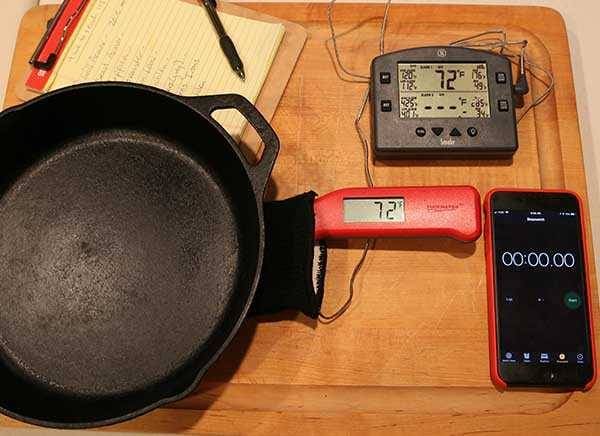
- Heat resistance. This is probably the most important test. After all, we pick up hot metal grates, pots and pans with gloves expecting the gloves to protect us from the heat. But for how long? To find out, I inserted a high quality digital thermometer probe in the palm of each glove and then heated a cast iron pan to 500°F. I placed the hot pan on the palm of the glove and measured how long it took for the thermometer to reach 113°F, the temperature at which NASA deems metal to be too hot for astronauts to handle. If that temp is good enough for astronauts, it’s good enough for pitmasters! I lifted hot pans, skillets and Dutch ovens, and dipped some of the 100% silicone gloves in 350ºF deep-frying oil and in boiling water.
- Dexterity. While wearing the gloves, I picked up and used barbecue tongs as well as a knife.
- Comfort. I noted whether or not the gloves felt comfortable, tight, loose, or sweaty; whether the fingers were fully bendable; and how the gloves felt after being worn for 20 to 25 minutes over a hot grill.
- Food handling. For the gloves intended to handle food, I carried pork butts, a slab of ribs and a beef brisket directly from the hot grill to a holding box.
- Cleaning. I also tested how easy they were to clean.

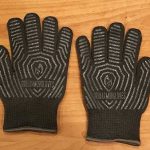
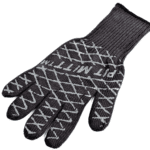
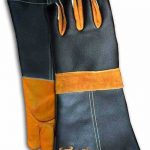
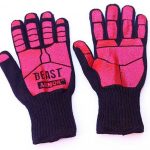
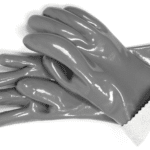
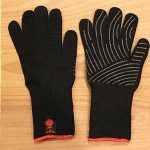
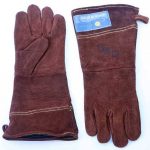
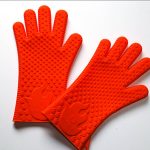
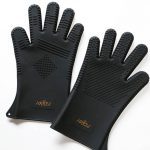
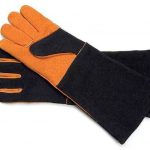
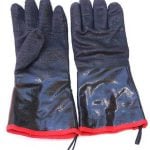
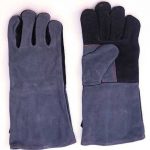
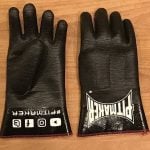
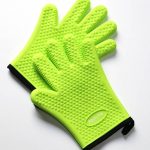

High quality websites are expensive to run. If you help us, we’ll pay you back bigtime with an ad-free experience and a lot of freebies!
Millions come to AmazingRibs.com every month for high quality tested recipes, tips on technique, science, mythbusting, product reviews, and inspiration. But it is expensive to run a website with more than 2,000 pages and we don’t have a big corporate partner to subsidize us.
Our most important source of sustenance is people who join our Pitmaster Club. But please don’t think of it as a donation. Members get MANY great benefits. We block all third-party ads, we give members free ebooks, magazines, interviews, webinars, more recipes, a monthly sweepstakes with prizes worth up to $2,000, discounts on products, and best of all a community of like-minded cooks free of flame wars. Click below to see all the benefits, take a free 30 day trial, and help keep this site alive.
Post comments and questions below
1) Please try the search box at the top of every page before you ask for help.
2) Try to post your question to the appropriate page.
3) Tell us everything we need to know to help such as the type of cooker and thermometer. Dial thermometers are often off by as much as 50°F so if you are not using a good digital thermometer we probably can’t help you with time and temp questions. Please read this article about thermometers.
4) If you are a member of the Pitmaster Club, your comments login is probably different.
5) Posts with links in them may not appear immediately.
Moderators